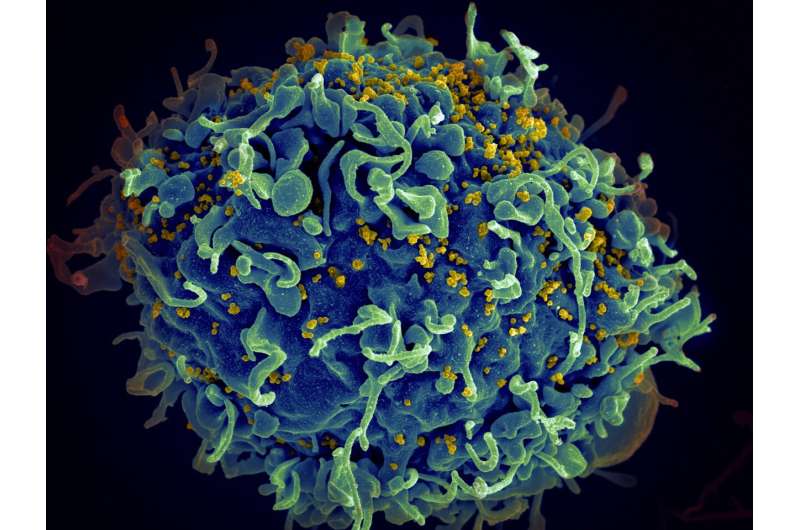This article has been reviewed according to Science X's editorial process and policies. Editors have highlighted the following attributes while ensuring the content's credibility:
fact-checked
proofread
Study suggests dapivirine vaginal ring is safe to use as HIV prevention during breastfeeding

A monthly vaginal ring containing the antiretroviral drug dapivirine—an HIV prevention method that has been approved in several African countries and recommended by the World Health Organization (WHO) –appears to be safe when used during breastfeeding, suggest results of a Phase IIIb open-label study presented today at the Conference on Retroviruses and Opportunistic Infections (CROI 2023) in Seattle.
The B-PROTECTED (MTN-043) study, which was conducted in Malawi, South Africa, Uganda, and Zimbabwe, found that while drug could be detected in breastmilk, the absolute levels were very low and the amount of drug ingested by babies even lower, posing no safety concerns.
"We believe this favorable safety profile, along with the data demonstrating extremely low concentrations of dapivirine transferred to infants, supports the inclusion of breastfeeding populations in global and national guidelines on the use of the dapivirine vaginal ring for HIV prevention," said Jennifer E. Balkus, Ph.D., MPH, associate professor of epidemiology at the University of Washington School of Public Heath, who is protocol co-chair of the B-PROTECTED study and presented its findings.
"Women need safe and effective methods for HIV prevention they can use at all times of their lives, perhaps especially when they are breastfeeding, which we know to be a time of heightened risk for infection—this is why these results are so important," added Maxie Owor, MBChB, MMed (Paed), MPH, the study's protocol chair and an investigator based at the Makerere University-Johns Hopkins University (MU-JHU) Research Collaboration in Kampala, Uganda.
The risk of acquiring HIV during breastfeeding is estimated to be up to four times higher compared to other periods in life.
B-PROTECTED and its companion study, DELIVER (MTN-042), were designed to provide the kind of information regulatory authorities and national programs would need to consider making the dapivirine ring available to breastfeeding and pregnant women and enable health care providers, and women themselves, to make informed choices about whether to use the ring while pregnant or breastfeeding. Yesterday at CROI, researchers also reported results to date from the ongoing DELIVER study finding no safety concerns with ring use during the third trimester of pregnancy.
B-PROTECTED enrolled 197 cisgender breastfeeding women and their 6- to 12-week-old babies. Women were randomly assigned to use either the monthly dapivirine vaginal ring or Truvada as daily oral PrEP (short for pre-exposure prophylaxis) for three months, with three times as many participants assigned to use the dapivirine ring—148 women used the dapivirine ring (inserting a new ring each month) and 49 women were assigned to use Truvada as daily oral PrEP. Both mothers and their babies were followed for an additional two weeks after they stopped using study product. At different time points during the study, researchers assessed how much drug from each product could be measured in blood samples from the mothers, how much was present in breast milk, and how much could be measured in blood samples from the babies.
Most of the information about the safety of Truvada (which contains emtricitabine and tenofovir disoproxil fumarate) during pregnancy and breastfeeding is based on its use for the treatment of HIV in combination with other drugs, with a growing body of evidence finding it safe to use for HIV prevention during pregnancy and breastfeeding as well. Much less is known about the dapivirine ring's use during pregnancy and breastfeeding. B-PROTECTED is the first study of the dapivirine ring in women who are actively breastfeeding. (Likewise, DELIVER is the first study of the ring in pregnant women.)
An earlier study called MTN-029/IPM 039 in which 16 participants in the US who were no longer breastfeeding their babies but still producing milk found dapivirine was detected at very low concentrations in breast milk and noted no safety concerns after 14 days of using the ring. The study was designed so that babies would not be exposed to drug, but based on levels measured in maternal breastmilk, researchers estimated that an infant's daily exposure to drug would be very low.
In B-PROTECTED, the dapivirine levels in breastmilk were similarly low and, indeed, the amount of drug infants were exposed to via breast milk was even lower. As expected, drug levels for Truvada (as measured by tenofovir diphosphate) were low as well, confirming what has been seen in other studies.
"This was one of the most rigorous studies for quantifying drug concentrations for oral PrEP during breastfeeding and the only study of its kind of the dapivirine vaginal ring conducted in mother-infant pairs, and the data it has generated is very reassuring for both products, but particularly for the dapivirine ring," commented Lisa Noguchi, Ph.D., CNM, director for Maternal and Newborn Health, Jhpiego, and research associate at the Johns Hopkins Bloomberg School of Public Health, who served as B-PROTECTED protocol co-chair and also led the MTN-029/IPM 039 study.
The monthly dapivirine vaginal ring, which was developed by the non-profit International Partnership for Microbicides (IPM), received a positive scientific opinion from the European Medicines Agency in July 2020 for its use by cisgender women at high risk for HIV who cannot or choose not to use daily oral PrEP, and in 2021, WHO recommended the ring as an additional prevention option for women. Countries that have approved the dapivirine ring include Kenya, Rwanda, South Africa, Uganda and Zimbabwe, among others. In mid-2022, the dapivirine vaginal ring and other IPM assets were transferred to the Population Council, a global nonprofit research organization.


















